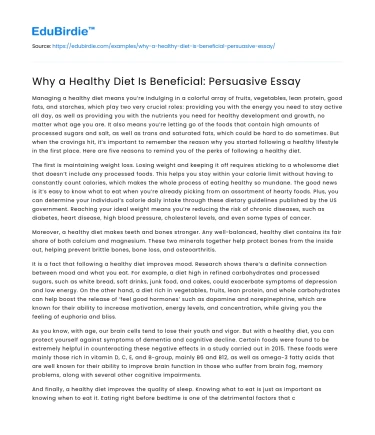Managing a healthy diet means you’re indulging in a colorful array of fruits, vegetables, lean protein, good fats, and starches, which play two very crucial roles: providing you with the energy you need to stay active all day, as well as providing you with the nutrients you need for healthy development and growth, no matter what age you are. It also means you’re letting go of the foods that contain high amounts of processed sugars and salt, as well as trans and saturated fats, which could be hard to do sometimes. But when the cravings hit, it’s important to remember the reason why you started following a healthy lifestyle in the first place. Here are five reasons to remind you of the perks of following a healthy diet.
The first is maintaining weight loss. Losing weight and keeping it off requires sticking to a wholesome diet that doesn’t include any processed foods. This helps you stay within your calorie limit without having to constantly count calories, which makes the whole process of eating healthy so mundane. The good news is it’s easy to know what to eat when you’re already picking from an assortment of hearty foods. Plus, you can determine your individual’s calorie daily intake through these dietary guidelines published by the US government. Reaching your ideal weight means you’re reducing the risk of chronic diseases, such as diabetes, heart disease, high blood pressure, cholesterol levels, and even some types of cancer.
Save your time!
We can take care of your essay
- Proper editing and formatting
- Free revision, title page, and bibliography
- Flexible prices and money-back guarantee
Moreover, a healthy diet makes teeth and bones stronger. Any well-balanced, healthy diet contains its fair share of both calcium and magnesium. These two minerals together help protect bones from the inside out, helping prevent brittle bones, bone loss, and osteoarthritis.
It is a fact that following a healthy diet improves mood. Research shows there’s a definite connection between mood and what you eat. For example, a diet high in refined carbohydrates and processed sugars, such as white bread, soft drinks, junk food, and cakes, could exacerbate symptoms of depression and low energy. On the other hand, a diet rich in vegetables, fruits, lean protein, and whole carbohydrates can help boost the release of ‘feel good hormones’ such as dopamine and norepinephrine, which are known for their ability to increase motivation, energy levels, and concentration, while giving you the feeling of euphoria and bliss.
As you know, with age, our brain cells tend to lose their youth and vigor. But with a healthy diet, you can protect yourself against symptoms of dementia and cognitive decline. Certain foods were found to be extremely helpful in counteracting these negative effects in a study carried out in 2015. These foods were mainly those rich in vitamin D, C, E, and B-group, mainly B6 and B12, as well as omega-3 fatty acids that are well known for their ability to improve brain function in those who suffer from brain fog, memory problems, along with several other cognitive impairments.
And finally, a healthy diet improves the quality of sleep. Knowing what to eat is just as important as knowing when to eat it. Eating right before bedtime is one of the detrimental factors that can send your sleep pattern into chaos. Others include sleep apnea, anxiety, certain medications, smoking and alcohol, and of course, bad eating habits, which can have a negative effect on the quality of your sleep. And it quickly turns into a cycle of not getting enough sleep, then waking up the next day cranky and tired only to crave fatty foods all day long, which leads to more nights of poor sleep.
In summary, following a healthy diet has many benefits that have been discussed in this paper. It’s important to note that a healthy diet goes hand in hand with regular, moderate exercise each week. Together, these two elements help support a healthy, well-balanced lifestyle to promote physical, mental, and emotional health for years to come.






 Stuck on your essay?
Stuck on your essay?

